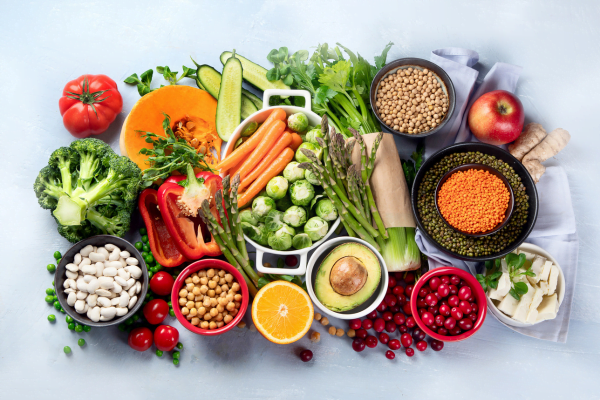Imagine a world where thirst is unquenchable, hunger ever-present, and the body struggles to use the fuel it desperately needs. This isn’t science fiction; it’s the reality for millions living with diabetes, a condition spreading like wildfire across the globe.
But there’s a ray of hope sprouting from the ground up. Plant-based nutrition, a dietary approach emphasizing whole, plant-derived foods, is emerging as a potential weapon in the fight against this growing health crisis. Could the answer to managing and even preventing diabetes lie in the very plants that sustain us? Let’s dig in and explore this exciting possibility.
Nutrient-Rich Profile of Plant-Based Foods
Plant-based nutrition focuses on consuming predominantly or exclusively plant-derived foods, including fruits, vegetables, grains, legumes, nuts, and seeds. This dietary approach emphasizes whole, minimally processed foods while limiting or excluding animal products such as meat, dairy, and eggs. By centering meals around plant sources, you can access a diverse array of nutrients crucial for overall health and well-being.
Plant-based foods boast a rich nutritional profile, offering a plethora of vitamins, minerals, fiber, and phytonutrients. Fruits and vegetables are particularly abundant in essential vitamins, including vitamin C, vitamin A, and various B vitamins. Additionally, they provide minerals like potassium, magnesium, and calcium, which are vital for maintaining healthy blood pressure and bone health.
Whole grains like quinoa, brown rice, and oats are excellent supplies of complex carbohydrates and dietary fiber, stimulating satiety and stable blood sugar levels. Legumes, including beans, lentils, and chickpeas, offer a combination of protein, fiber, and complex carbohydrates, making them valuable components of a plant-based diet.
Nuts and seeds contribute healthy fats, protein, and micronutrients such as vitamin E and zinc. These nutrient-dense foods can enhance heart health and provide sustained energy throughout the day.
How Plant-Based Diet for Diabetes Can Aid in Blood Sugar Control?
Plant-based diets have shown promise in helping you manage blood glucose levels, which is necessary for diabetes management. Several elements contribute to the beneficial effects of plant-based nutrition on blood sugar control:
Fiber Content
Plant-based foods are high in dietary fiber, including soluble and insoluble fibers. Soluble fiber, present in oats, legumes, and select fruits, creates a gel-like texture in the digestive system, which delays the absorption of glucose. Insoluble fiber, abundant in vegetables, aids in digestion and may also have a modest impact on blood sugar regulation.
Low Glycemic Index (GI)
Many plant-based foods, such as non-starchy vegetables, legumes, and whole grains, have a low glycemic index. This implies that they induce a more gradual and consistent increase in blood sugar levels in contrast to high-GI foods such as refined grains and sugary snacks. Consuming predominantly low-GI foods can help prevent spikes and crashes in blood sugar levels, refining glycemic control over time.
Antioxidants and Phytonutrients
Plant-based foods contain high amounts of antioxidants and phytonutrients, which possess anti-inflammatory and insulin-sensitizing properties. These compounds may help protect pancreatic beta cells, which produce insulin, from damage triggered by oxidative stress and inflammation. By supporting optimal pancreatic function and insulin sensitivity, plant-based diets for diabetes can contribute to more stable blood sugar regulation.
Practical Tips for Implementing a Plant-Based Diet
Transitioning to a plant-based diet for diabetes doesn’t have to happen overnight. Gradual changes can make the transition smoother and more sustainable. Here are some tips:
- Start by integrating plant-based meals into your diet each week. Replace one or two meat-based meals with plant-based alternatives.
- Experiment with different diabetes vegetarian recipes and cuisines to discover new flavors and ingredients.
- Gradually reduce consuming animal products while increasing intake of fruits, vegetables, legumes, whole grains, and seeds.
- Listen to your body and adjust your diet based on how you feel. Pay attention to your energy levels, digestion, and overall well-being as you make changes to your eating habits.
Many people worry about getting enough protein and essential nutrients on a plant-based diet. Here are some strategies to address these concerns:
- Focus on variety and balance. Eating a diverse range of plant-based foods ensures that you get all the essential nutrients your body needs.
- Include a wide range of protein-rich plant foods in your diet, including beans, lentils, chickpeas, tofu, tempeh, seitan, edamame, nuts, and seeds.
- Incorporate fortified foods, such as fortified plant-based milk, nutritional yeast, and fortified breakfast cereals, to ensure adequate intake of nutrients like vitamin B12, calcium, and vitamin D.
- Consider taking a vitamin B12 supplement, especially if you’re following a strictly plant-based diet, as B12 is primarily found in animal products.
- Work with a registered dietitian or nutritionist who specializes in plant-based nutrition to create a personalized meal plan that meets your nutritional needs.
By recognizing and implementing these practical tips, you can gradually transition to a plant-based diet. With careful planning and experimentation, you can enjoy the health benefits and advantages of a plant-based diet while managing diabetes effectively.
Frequently Asked Questions (FAQs)
Is an insulin resistance diet similar to a plant-based diet?
An insulin resistance meal plan or diet focuses on managing blood sugar by emphasizing whole grains, lean proteins, and vegetables, with some including moderate amounts of lean meats and dairy. It differs from a plant-based diet, which typically excludes animal products altogether.
What green vegetable is bad for diabetes?
While no single green vegetable is universally bad for diabetes, starchy vegetables like peas, corn, and potatoes can impact blood sugar levels more significantly due to their higher carbohydrate content.
Is a vegan diabetic diet safe?
A vegan diabetic diet can be safe and beneficial, emphasizing whole, plant-based foods rich in fiber, vitamins, and minerals. However, attention to nutrient balance, including protein, vitamin B12, and omega-3 fatty acids, is crucial.


